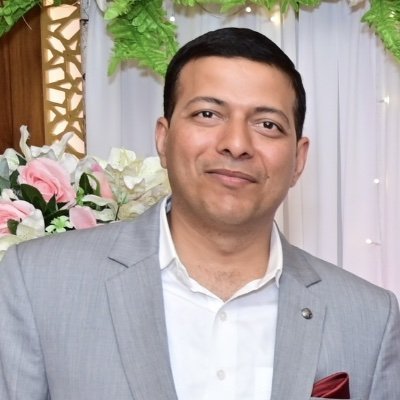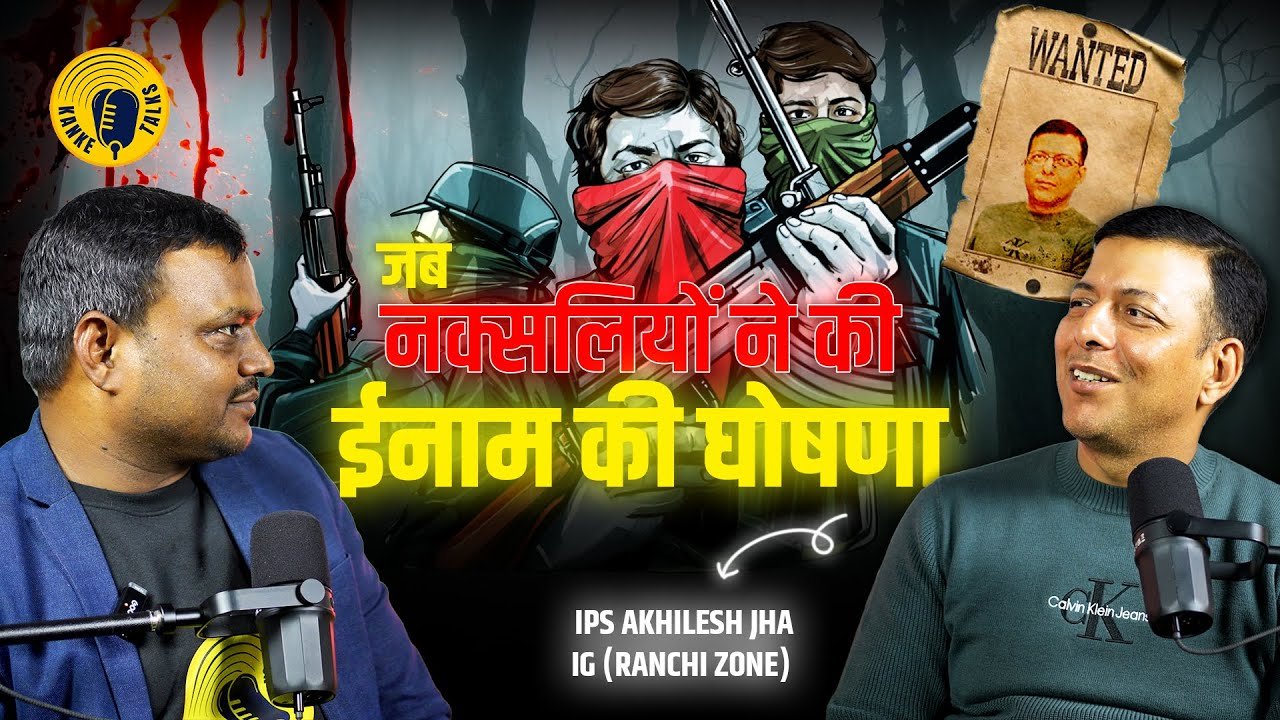In the silent corridors of law enforcement, where decisions weigh heavier than medals, one man’sstorystandsout—notbecauseit’sdramatic,butbecauseit’sdeeplyhuman.Akhilesh Jha,IPSOfficerfromthe2003batchandcurrentInspectorGeneralofRanchiZone,isnot just a policeman. He is a thinker, a teacher at heart, and a torchbearer of balanced policing in turbulent times.
This is the story of a man who left a predictable path in economics and academia to walk into Jharkhand’s Naxal zones, where life was as fragile as the trust people had in the system. It’s the journey of a soldier of the Constitution, who learned to lead with calm in chaos, compassion in conflict, and courage in crisis.

From Classrooms to Conflict Zones
Akhilesh Jha’s beginnings were humble and cerebral. He was pursuing his post-graduation in Economics from the Delhi School of Economics,one of India’s premier institutions. He dabbled in teaching and worked briefly as an economist at the National Institute of Public Finance and Policy. But something kept tugging at him.
“Economics was not my destination—it was just a detour,” here calls. The real call was civil services, a dream rooted in childhood and nurtured by a desire to serve his people in a more grounded, immediate way.
When he cleared the UPSC in 2003 Jharkhand was in the throes of a raging Naxal insurgency. Most would’ve chosen comfort. He chose conflict.
Baptism by Fire: Bokaro & Chatra
His first posting as a probationer was in Bokaro, but his real test came in Chatra — a district notorious for Naxalite violence. The region wasn’t just dangerous; it was psychologically draining. In one of his earliest encounters, his contingent was ambushed, and several colleagues were martyred. “When bullets fly past you, your training kicks in — but so does your humanity,” he recalls.
It wasn’t just about strategy; it was about survival. He quickly learned that, as an independent district head, the weight of every life — civilian and police — rested on his decisions.
Commanding in Chaos: The Weight of Leadership
Leadership in Naxal zones isn’t just about operations — it’s about managing emotion, fear, and the temptation for revenge.
“When one of our constables was killed, the rage was real,” he admits. “But revenge is not policing. Justice is.”
This internal battle — between human instinct and professional restraint — came to define his philosophy of policing. Emotions were valid, but decisions had to remain cool-headed. One wrong move could cost ten lives or ignite a larger bloodbath.
Personal Sacrifices, Professional Resolve
In Chatra, Akhilesh Jha’s name was on the Naxal hit list. A bounty was announced. His mother begged him to leave the job. During operations, his wife couldn’t reach him for days. Meanwhile, his father—a defense accounts officer—understood, but worried in silence.
Yet, he stayed. “You don’t become a police officer for medals. You do it for the hope that one day, your presence will make a village feel safer.”
Policing and Philosophy: Beyond the Uniform
Jha is not your stereotypical cop. He’s philosophical, articulate, and introspective. He compares Naxalism to a virus in a body with weakened immunity. “Underdevelopment, inequality, and ideological extremism are the breeding grounds,” he explains.
But he’s also optimistic. “In the last 20 years, we’ve pushed Naxalism to the brink. Jharkhand is not what it was. The reach of police, roads, and schools has improved. But if we stop now, revival is possible.”
The Changing Face of Crime: Cyber and Civil
While Naxalism fades, cybercrime rises. And Jha is quick to adapt. “Today’s criminals aren’t hiding in forests — they’re hiding behind firewalls.”
He speaks about “digital arrest” scams, sextortion, and phishing. “It’s not just the gullible who get duped. Even educated professionals fall prey.”
He advocates for prevention over punishment. His advice?
“Don’t keep all your money in one account. Treat the internet like a crowded street — stay alert, protect your identity, and never act out of fear or greed.”
Traffic Accidents: The Unspoken Killer
In Ranchi district alone, over 400 deaths a year are caused by road accidents.
“It’s worse than murders,” he says. “And it’s preventable.”
For Jha, crime is not just theft or violence — it’s anything that takes life away needlessly. His campaigns include road safety awareness, especially during festival seasons.
Youth, Drugs, and Crime: A Society’s Blindspot
Jharkhand’s opium-growing districts like Chatra and Latehar are a new front in the fight against organized crime.
But Jha’s concern is more about demand than supply.
“We must protect our youth. Addiction begins as a trend, but ends in tragedy.”
He calls on communities to be watchful — to alert police if a group of teens suddenly starts gathering suspiciously.
“Crime indicators are like flu symptoms. If we catch them early, we can stop the disease.”
The Real Challenge: Building Trust
Jha laments the disconnect between the public and the police.
“People are taught to fear us. But we’re public servants, not weapons.”
He encourages citizens to speak up, report concerns, and hold the police accountable. His own tweet on grassroots policing — where even junior officers listen to citizens’ problems at the thana level — was widely appreciated.
“We need to humanize the uniform,” he says.
Reel vs Real: Message to Young Officers
To the young officers and aspirants entering service, his message is clear:
“Don’t look for shortcuts. There’s no hack to credibility. Put in the hard work. Earn people’s respect. Leadership isn’t a badge — it’s a responsibility.”
He warns against reel culture, where optics matter more than outcomes.
“Real policing happens in silence, not selfies.”
Brand Slavery and Inner Freedom
Akhilesh Jha also has a refreshing take on consumerism and identity.
He calls out what he terms “brand slavery” — where people associate self-worth with logos and labels.
“Wear good clothes, enjoy comforts. But don’t let them define you.”
He draws from his own simple roots.
“In my village, clothes were stitched, not bought off a brand shelf. And we were content. Today, people chase status symbols and lose themselves.”
Police and Sports: Building Society Off the Field
Jha is deeply connected to Jharkhand’s sports scene — especially hockey and football in tribal belts. Through community policing efforts, footballs are distributed in conflict zones.
“Sports change perception. When kids see a cop not with a gun but with a football, trust begins.”
He’s a life member of JSCA (Jharkhand State Cricket Association), plays lawn tennis, and firmly believes that sports can be a powerful tool to reconnect the police with the people.
After Uniform: The Teacher Within
Akhilesh Jha’s first love was teaching, and it remains his post-retirement plan.
“After my PhD, I hope to return to the classroom. I want to stimulate intellectual discourse in society.”
He believes policingneedsmorethinkers.“Discussions,debates,anddissentarethe lifelines of a healthy democracy. And police must protect that space.”
He believes policing needs more thinkers.
“Discussions, debates, and dissent are the lifelines of a healthy democracy. And police must protect that space.”
Last Words: Service, Not Just Security
In his final reflections, Akhilesh Jha makes a passionate case for generosity in policing.
“Be sympathetic like a doctor. Listen like a teacher. Act like a guardian.”
Whether it’s a domestic dispute or a heinous crime, his approach remains the same: serve, not dominate.
He ends with a quote that could well define his life:
“Earn your money honestly. Earn your reputation slowly. And leave the world a little safer than you found it.”

No responses yet